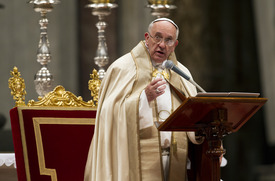 Pope Francis
Pope Francis Since Pope Francis was elected last year, many dear readers have asked for a “laptop” on his approach to the papacy. I have not done so, first because, well, I don’t feel quite competent to evaluate Popes. Moreover, I think it best to wait at least few months before forming opinions about the “new man,” especially given that the media is both ignorant and antipathetic to the very mission of the papacy. I can remember the first years of both John Paul II Benedict XVI, and both were subject to rash judgments that were later, sheepishly, retracted by those of good will.
That said, I’m reading Evangelii gaudium and am inspired. Before mentioning my thoughts on Evangellii (“The Joy of the Gospel,” Pope Francis’ first signature document), however, I would like to mention an insight I gained in December after reading an AP story on the office of “Papal Almoner,” which Pope Francis recently retooled. The Papal Almoner is usually an aging Archbishop whom the Pontiff entrusts with disbursing papal alms to the poor. At least in recent memory, the Almoner did most of his work from his desk, receiving requests for aid and writing checks to be mailed to needy people.
The new Almoner is a younger Polish archbishop, Konrad Krajewski (age 50), who was close to John Paul II. “The Holy Father told me at the beginning,” he told Associated Press, “ ‘You can sell your desk. You don't need it. You need to get out of the Vatican. Don't wait for people to come ringing. You need to go out and look for the poor.’ ” According to the AP story, Archbishop Krajewski gets his marching orders each morning, receiving a bundle of letters that the Pope has received from the faithful asking for help. On the top of each letter, Pope Francis might write “You know what to do” or “Go find them” or “Go talk to them.”
I think this little story, unnoticed by most, indicates the heart of Papa Francesco. I’m sure he will make many mistakes, and he will be manipulated by evil prelates, but he is serious about serving Jesus in the poorest of the poor, and “charity covers a multitude of sins” (1 Peter 4:8). He wants the Church to focus on people, not papers and projects. He continues the brave tradition of St. Lawrence, one of the seven deacons of Rome in the year 258. Lawrence was the Almoner and “CFO” of the Church at the time, entrusted with distributing money to the poor. The pagan Prefect of Rome demanded St. Lawrence gather all the Church’s wealth and present it to the government. After three days, Lawrence brought the Prefect into a place where he had gathered all the poor of the city and said: "Behold in these poor persons the treasures which I promised to show you; to which I will add pearls and precious stones, those widows and consecrated virgins, which are the church’s crown." The Prefect didn’t think it was so funny, and had Lawrence grilled alive, but St. Lawrence never lost his good cheer.
But a few thoughts on Pope Francis’ Evangelii gaudium. His style manifests a joyful energy, a breathless impatience to reform certain decrepit structures in the Church. He often expresses himself imprudently, in my opinion, and this will lead to manipulation and confusion. But perhaps his freshness and freedom of expression will gain the ear of many who have not listened to more traditional forms of papal address. People accuse him of singlehandedly redefining the Church’s social teaching, but I don’t read anything essentially different in this document than what John Paul and Benedict said in their social documents (although I gave it only a quick read).
He seems, however, at least to my sensibilities, to spend a lot of time criticizing, and usually criticizing the “conservative” rather than the “liberal” mindset. For example, in #54 his by now famous criticism of capitalism is not balanced by a similar criticism of communism. In #44 he criticizes priests who turn the confessional into a “torture chamber” by condemning their penitents. But at least in North America and Europe, confessionals are much more like cocktail lounges than torture chambers, and the problem is not overly strict confessors but overly lax confessors.
The document is exciting to read, kind of like watching a swashbuckling movie, with protagonists jumping all over the place defending victims of injustice. It is a little as if St. John Chrysostom became Pope. Chrysostom preached without restraint against the obtuse Byzantine court, and Francis is preaching with very little restraint against the obtuse ecclesial structures of our own day. It’s often inelegant, but something we certainly need to hear and take to heart.


 RSS Feed
RSS Feed